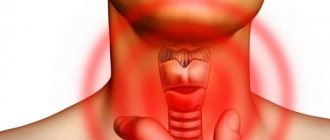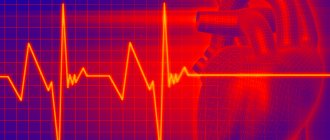Sharp surges in blood pressure during menopause are observed quite often in women, so they can be considered a clear and characteristic symptom of the onset of this period. More often, pressure during menopause increases rather than decreases, which depends on the natural processes occurring in the body of the fair sex.
Most women are interested in the answer to the question - how can you reduce blood pressure during menopause, what medications are allowed to take, and is it necessary to treat hypertension during menopause? We'll talk about this further.
Causes of blood pressure instability during menopause
Women who did not experience problems with blood pressure before menopause may begin to come up with various excuses for the fact that it began to rise. Usually these reasons have nothing to do with menopause itself. The woman is inclined to believe that she was simply tired, nervous, drank a lot of coffee, and did not get enough sleep.
Attention! According to statistics, high blood pressure worries almost half of all women who are at the age of menopause. Because of this, many women develop such terrible diseases as heart attacks, strokes, and atherosclerosis.
And yet, why is pressure not stable during menopause?
- Violation of water-salt metabolism in a woman’s body. The fluid no longer circulates normally in the body; some of it is retained in the tissues. Because of this, deposits of sodium, that is, salt, are formed in the tissues, and the increased salt content in the blood accelerates the work of the heart, and its pressure increases.
- During menopause, emotional state is unstable: she is more stressed than usual. It costs nothing to make her nervous and make herself nervous, and many ladies are in a depressed state almost constantly.
- For normal functioning during the day, the body must fully rest at night, and a woman is not always able to do this, since at night she is tormented by sweating, hot flashes, a feeling of fear and anxiety. Because of this, the pressure can either rise sharply or drop just as sharply.
- The lack of sex hormones leads to the fact that body tissues become less plastic and elastic, and are severely damaged. Vessels will not escape this fate either. At the same time, the blood becomes thicker, making it difficult for it to move through the vessels. Among other things, some people have increased cholesterol with age, which can lead to the deposition of plaque inside the blood vessels. That is, blood begins to circulate much worse, which is where high blood pressure comes from.
Manifestations of menopause leading to hypertension
Not only the decrease in the amount of female hormones itself affects the occurrence of hypertension, but also other pathologies of the body that develop with the advent of menopause:
- unbalanced hormone intake;
- obesity - puts a high load on the cardiovascular system;
- changes in the heart muscle;
- increased susceptibility to Na. Salt accumulates intensively in the vessels, and it attracts water. The result of this is that the blood volume increases, leading to pressure in the vessels;
- increased resistance of blood vessels;
- nervousness, panic attacks;
- adrenal tumor;
- vegetative-vascular dystonia.
What is vegetative-vascular dystonia?
This disease is well known in the modern world and is the subject of discussions among doctors with academic degrees. This concept represents disorders of the nervous system, and is accompanied by one hundred and fifty symptoms. These symptoms may indicate diseases of various organs of the body, but in fact the causes of the disorders lie in an unstable psyche with overly sensitive emotions.
VSD often manifests itself in premenopause, when new sensations begin to frighten a woman and she becomes afraid of death.
- headache;
- the appearance of hot flashes;
- increased heart rate;
- sudden change in mood;
- I often want to urinate.
Symptoms of hypertension
There are a number of symptoms that help recognize hypertension. It is very important to know them, since the disease is dangerous, and it is necessary to take appropriate measures. Also, one of your loved ones may find themselves in a similar situation, and, knowing the symptoms, you can help him with a condition such as hypertension.
- Headache.
- Pain in the chest and heart.
- Darkening of the eyes or any other visual disturbances.
- Bleeding from the nose.
- Difficulty breathing, shortness of breath.
- Swelling of the arms and legs (this symptom in most cases is characteristic of women).
- Increased nervous tension, irritability.
How to treat hypertension during menopause?
Any sane person understands that if the body lacks hormones, then they need to be replenished. Hormones are sold in tablet form, however, they have too many side effects, one of which is pressure surges. Therefore, taking hormones is advisable only in cases where women’s blood pressure during menopause is remarkably stable. In the case of high blood pressure, there can be no talk of treatment with hormones.
In principle, an attack of high blood pressure in menopausal women can be treated with the same means as in the most classic cases of high blood pressure.
However, when choosing medications, consultation with your doctor is required, as he will help you choose the medications that are more appropriate to use during menopause and that will be of great benefit to the body. Consulting a doctor will also be useful for the reason that many high blood pressure medications also have serious side effects: some of them cause allergic reactions, so it is important not to cause harm.
Hypertension can be treated with a single drug or may involve taking several types of medications at the same time.
First of all, a woman will have to reconsider her diet if she really wants to get rid of high blood pressure. A woman’s condition during menopause directly depends on what she eats. You need to provide your daily diet with fresh vegetables and fruits, try to exclude or minimize fatty and salty foods, as they provoke an increase in blood pressure. Don't get carried away with sweets. But you will have to forget about alcoholic drinks and cigarettes once and for all, since menopause and bad habits get along very poorly with each other.
If you follow these simple rules, a woman’s condition during menopause will already improve significantly.
How a woman can help herself
The entire period of menopause (perimenopause) is divided into premenopause (from the beginning of a decrease in the secretion of sex hormones until the complete cessation of menstruation), menopause (the last menstruation, the occurrence of which is confirmed only after a year) and postmenopause.
Menopause during premenopause occurs against the background of decreased secretion and deficiency of sex hormones (estrogens and progesterone) and causes prolonged stress in women, while in postmenopause the body adapts to the new state. Therefore, the symptoms and treatment of pressure during menopause in women during its different periods will be different. Permenopause is characterized by “jumps” in blood pressure, while postmenopause is characterized by its stabilization.
As women approach old age, there is a tandem of two concepts – menopause and blood pressure.
And when pressure surges begin during menopause, women do not begin treatment because they think that these symptoms are random, and may not even understand what is wrong with them.
What happens is this: when menopause begins, the amount of female sex hormones decreases, and this leads to pressure changes and poor condition of the blood vessels. While the fairer sex is young, estrogens act on the collagen cells responsible for the elasticity of the walls of blood vessels, expand their beds, and also prevent excess calcium from clogging the circulatory system.
Therefore, when premenopause begins with its surges in hormones, the circulatory system becomes prone to stagnation of the walls of blood vessels; collagen and elastin deficiency leads to narrowing of blood vessels and their fragility. Blood flow passes through them with difficulty, and it becomes thicker during menopause, and this creates the preconditions for pressure surges to occur during menopause.
This is how hypertension occurs, that is, persistent high blood pressure.
So we looked at why blood pressure can jump during menopause and what are the reasons for the development of hypertension. Now let’s answer the age-old question – what to do to reduce blood pressure. First, change your lifestyle. Secondly, contact a cardiologist and begin treatment for developing hypertension.
Let's start in order and look at what changes you should make to your established lifestyle to improve your well-being. Climax is translated into Russian as a step.
Expert opinion
Alexandra Yurievna
General practitioner, associate professor, teacher of obstetrics, work experience 11 years.
On average, menopause hits a woman at 45 years of age. This is the age of maturity. A lady should change her behavior in order to feel good at the stage of mature life.
Changing our lifestyle
A woman needs to make the following changes to her lifestyle:
- Adjust your diet according to your age. You need to give up salty, sweet, spicy and fatty foods. These foods increase blood viscosity and increase cholesterol levels. The basis of the new diet should be vegetables, fruits, berries, legumes, nuts, seafood and fish, as well as low-fat lactic acid products, high-quality olive and sunflower oil. It is necessary to properly prepare healthy foods to get the maximum benefit from them. You need to cook without oil, and add it to already prepared dishes. Therefore, you should boil, bake and stew, but not fry. Switching to such a diet will thin the blood, improve the condition of the walls of blood vessels and the functioning of the heart.
- Adhere to the optimal drinking regime. Many ladies, fearing swelling, begin to drink little fluid. This is the wrong approach. You need to drink 1.5-1.8 liters of clean water per day. With proper nutrition and sufficient physical activity, water will not stagnate in the body, but will be constantly excreted along with salt.
Remember that blood pressure levels increase with age.
Move a lot and breathe fresh air. You can choose any sport and practice it regularly at a moderate pace. Shaping, swimming, dancing, and yoga also have a good effect on physical fitness and prevent weight gain. Morning runs at a relaxed pace or walks in the park set a good rhythm for the whole day. Physical activity allows you to saturate cells with oxygen, normalize water-salt balance and all metabolic processes in the body. Thus, one of the causes of high blood pressure during menopause is neutralized.- Get rid of bad habits - smoking and drinking alcohol. Both habits provoke contraction and expansion of blood vessels and lead to increased blood pressure.
- Be more attentive to your health. Measure your blood pressure at least twice a day, even if you feel well – in the morning and in the evening. If the need arises, take the medication prescribed by your doctor for blood pressure during menopause. When a headache is accompanied by nausea, and a veil appears before your eyes, you need to call an ambulance for help. These are the first symptoms of a hypertensive crisis, which can develop very quickly and in an acute form. In order for the crisis to pass without consequences, prompt hospitalization is necessary.
The lifestyle we have described will allow a lady in adulthood to feel good every day. It will not only be able to reduce blood pressure, but also the intensity of the unpleasant symptoms of menopause (hot flashes, excessive sweating, headaches, weight gain).
Jumps in blood pressure during menopause require treatment. After all, changes in blood pressure can provoke the development of a dangerous disease: atherosclerosis, heart attack or stroke. In addition, they are dangerous for the kidneys, as they can lead to kidney failure. Also, they have a bad effect on the retina and can lead to its degeneration.
Treatment of pressure during menopause in women depends on the symptoms. Therefore, it is very important not only to contact a cardiologist on time, but to inform him of all the manifestations that accompany or precede pressure surges.
Expert opinion
Alexandra Yurievna
General practitioner, associate professor, teacher of obstetrics, work experience 11 years.
It is necessary to undergo a full medical examination. It will not take much time, but will allow you to make an accurate diagnosis. Only on the basis of the most complete information will the attending physician be able to prescribe effective treatment for blood pressure.
If the highest value during an attack does not exceed 180 mm Hg. Art., and during a medical examination it was revealed that hypertension during menopause was provoked by hot flashes and other specific symptoms, then the woman will be prescribed the following homeopathic remedies and preparations containing active substances of plant origin:
- Klimaktoplan;
- Klimadinon;
- Klimakt-hel;
- Remens.
Blood pressure is influenced by many factors.
All these medications are effective not only in reducing blood pressure. They reduce the intensity of other symptoms characteristic of the menopause: increased nervousness, hot flashes, profuse sweating, and others.
How long does this therapy last? Plant-based blood pressure pills are taken for a long time - from several months to six months or more. These drugs have a cumulative action.
How to deal when increased blood pressure is caused by emotional instability. In this case, the sedatives Motherwort and Valerian have a reducing effect.
They not only have a sedative effect, but are also able to relieve vasospasm and, as a result, reduce indicators. But only with a slight increase in performance.
It should be noted that treatment must be comprehensive. In addition to medications, sedatives are needed. After all, menopause is accompanied by an unstable psycho-emotional state of a woman who can become nervous over any minor situation, and this will lead to a surge in blood pressure.
Treatment with hormones
During menopause, high blood pressure caused by hormonal imbalance is effectively reduced with hormone replacement therapy (HRT).
It is carried out with tablets containing synthetic sex hormones:
- Divina;
- Klimonorm;
- Cyclo-Proginova.
After taking the drugs, the levels of sex hormones - estrogen and progesterone - rise in the body. Due to the fact that the cause of hypertension during menopause is eliminated, the effect of treatment occurs very quickly. The duration of treatment is prescribed only by the doctor, taking into account the result obtained and the general condition of the woman.
Traditional methods of treating high blood pressure during menopause
Traditional therapy for menopause is a good way to improve a woman’s general condition, however, before taking traditional medicine, you should also consult a doctor, since high blood pressure is a very serious disease.
Hawthorn, which can be consumed in several forms, is good for such problems:
- Hawthorn tincture is sold in a pharmacy in ready-made form: you need to take 40 drops of it, dissolving it in half a glass of water. The course of treatment should be specified by a doctor; for problems with blood pressure, it is consumed three times a day before meals.
- If you have dried hawthorn fruits or flowers on hand, then you need to pour boiling water over them, leave for half an hour and drink a third of a glass every day before meals.
- A decoction of hawthorn, chamomile and motherwort also helps solve problems with the heart and blood pressure. This remedy is taken one third of a glass per day before meals.
Prevention of high blood pressure during menopause
- Book a massage. Procedures that relax muscles help lower blood pressure.
- If something bothers you, then seek advice from a specialist in a timely manner.
- Once and for all, give up bad habits such as smoking and frequent drinking of alcohol.
- Drink vitamins, as the body during menopause needs additional support.
- Try to follow a diet.
- Expose your body to regular physical activity as much as you can.
- Don't sit still and mope! Try to find new hobbies, impressions and emotions, find a hobby or just something you enjoy that will help you maintain a good mood.
- Accept the inevitable; menopause is not the worst thing that can happen to a person.
Thus, menopause and hypertension stand side by side, but high blood pressure during menopause today is perfectly treatable, and the woman’s health in this case is only in her own hands. When signs of hypertension appear during menopause, treatment is carried out in several stages, and none of them should be neglected. Diet, prevention, medications, and a positive attitude are important.
Entertaining video on the topic:
Treatment with drugs
Drug treatment of high blood pressure, if it is caused specifically by menopause, and if it does not rise above 180 mmHg. Art., is carried out in the traditional way, which includes:
- Prescribing hormonal drugs to eliminate hormonal imbalance - the main cause of hypertension during menopause. Moreover, many unpleasant symptoms are removed and the general condition improves. Among the drugs in this group, it is worth highlighting Klimonorm, Divina, Cycloproginova.
- Prescribing homeopathic medicines if a woman is contraindicated in taking synthetic hormones. This category of drugs includes Klimen, Remens, Feminal, Qi-Klim. These drugs help reduce the frequency of hot flashes, relieve nervous tension, improve mood, and reduce sweating. They also improve vascular tone.
- Taking editives , which help a woman feel better during menopause and tolerate hot flashes more easily. They also reduce vascular spasms.
If blood pressure periodically rises above 180 mm Hg. Art., then specific treatment is prescribed, including taking ACE inhibitors with sulfhydryl, carboxyl and phosphinyl groups. These include the following drugs: Benazepril, Lisinopril, Fozinopril. With their help, the heart muscle is not at risk of hypertrophy, and the kidneys are not at risk of renal failure. These drugs can be taken even in case of a heart attack, in the presence of diabetes mellitus and atherosclerosis of the carotid arteries.
It is advisable to combine such medications with diuretics that help remove excess fluid from the body. Furosemide, Veroshpiron, Indapamide are diuretic drugs. But in addition to removing sodium salts, they also remove calcium, which is very undesirable during menopause, since joints and bones can become fragile and weak. Therefore, the use of these drugs should be prescribed by a doctor, who in addition will also prescribe drugs that compensate for the deficiency of this microelement in the body.
If high blood pressure during menopause is accompanied by darkening of the eyes, a severe and sharp headache, loss of consciousness or difficulty moving, then you must urgently contact an ambulance. These symptoms may indicate an upcoming stroke or hypertensive crisis.
Can blood pressure increase during menopause and how to deal with its fluctuations?
Sharp surges in blood pressure during menopause are observed quite often in women, so they can be considered a clear and characteristic symptom of the onset of this period. More often, pressure during menopause increases rather than decreases, which depends on the natural processes occurring in the body of the fair sex.
Most women are interested in the answer to the question - how can you reduce blood pressure during menopause, what medications are allowed to take, and is it necessary to treat hypertension during menopause? We'll talk about this further.
Medicines
Pressure during menopause in women may often require treatment with medications. For therapy, the doctor may prescribe the following medications:
During menopause, there is a global change in hormonal levels and a restructuring of most body systems. For some women, this condition does not cause any discomfort. Others experience it more problematically. Menopause has a significant impact on blood pressure. Conditions such as menopause and high blood pressure often occur simultaneously. The first symptoms of menopause and hypertension, which made themselves felt at one moment, indicate serious disorders. Therefore, if pressure surges occur, you should immediately contact a specialist.
Can blood pressure increase during menopause?
Menopause is a physiological and natural change in a woman’s hormonal levels, which can be observed at the age of 45-55 years.
Menopause has 3 periods of development: In each specific case, pressure increases differently.
Premenopause
The first period, during which it is possible to notice signs of the onset of menopause, is characterized by an increase in pressure based on hormonal changes occurring in the body. The duration of premenopause is 3-4 years. At this time, representatives of the fair sex notice irregularities in the menstrual cycle, namely:
- reduction in the volume of secretions;
- reducing the duration of critical days;
- increasing the time between cycles.
Already now, hypertension is already making itself felt, since low or normal blood pressure levels are often replaced by high ones. At first, such surges are short-lived and go away on their own, and the woman does not have to be treated for hypertension. Sometimes they are asymptomatic or similar to mild illness.
If the pressure level increases very often and reaches high levels, the patient needs to undergo therapy already during premenopause. Otherwise, the woman will begin to develop hypertensive attacks, however, against the background of the development of other menopausal symptoms, she will not pay attention to them.
Jumps in blood pressure during perimenopause can increase by several units or increase sharply, so it needs to be constantly monitored, measuring pressure daily if your general health deteriorates.
Menopause
When menopause occurs, a woman stops menstruating completely because the ovaries stop functioning. During this period, the pressure can either continue to rise or remain at a high level for a long time. It can only be normalized with the help of medications.
As a rule, during menopause, women already notice symptoms of hypertension, which means they can provide first aid to themselves in a timely manner.
Postmenopause
Postmenopausal women may also experience an increase in blood pressure. This happens because the body gets used to coping with work without hormones important for health. In this case, it is also necessary to treat hypertension so that the body quickly restores its performance and adjusts to a new regime.
Who is at risk?
According to statistics, pressure changes are observed in every second woman after 55 years.
An increase in blood pressure during menopause in women occurs due to a sharp change in the activity of the hormonal system. At the same time, many ladies claim that before the onset of menopause they did not have problems with the functioning of blood vessels and the heart, but during menopause they appeared, and quite acutely. In addition, pronounced symptomatic signs appeared indicating high blood pressure. Therefore, it will not be difficult to notice the development of hypertension.
Factors that cause blood pressure surges include:
- Hormonal changes in the female body, which are considered natural signs of aging.
- Frequent stress.
- Heredity.
- Obesity and being overweight.
- Increased cholesterol levels.
- Emotional overload.
- Nervous overstrain.
- Weakening the functioning of blood vessels and the heart.
- Kidney diseases.
- Deviations of blood composition from the norm.
Also, some ladies may be dependent on weather conditions and temperature changes.
It is also important to note that menopausal hypertension often causes complications, so you should not delay visiting a doctor - otherwise hypertension will increase the risk of significantly shortening the patient’s life.
Drug therapy
To normalize blood pressure in women during menopause, the doctor may recommend taking medications. The following groups of medications can be used:
- Diuretic medications.
- Sedatives.
- Hormonal agents.
- Homeopathic medicines.
Vitamin complexes are also prescribed to maintain the normal condition of the blood vessels, heart and general well-being of the woman.
You should not prescribe treatment for yourself. You need to listen to the opinion of a specialist. Otherwise, you may make the problem worse.
If the increase in blood pressure is small, you can do without the use of medications. To determine the advisability of taking medications, you must first undergo an examination.
Causes of blood pressure surges in older women
Why does blood pressure increase during menopause? There are several main hormonal reasons contributing to this condition:
- This happens due to the fact that the body stops producing estrogen, which causes vasodilation and suppresses the flow of calcium. Therefore, the vascular network is forced to narrow.
- Also, an increase in blood pressure occurs due to the cessation of progesterone production, thanks to which it was possible to normalize blood pressure. It worked in the form of calcium agonists that cleansed the kidney ducts.
Therefore, menopause and blood pressure are closely related.
In addition, sudden surges in pressure during menopause appear for the following reasons:
Reason type
Changes occurring in the body
Many middle-aged women believe that their blood pressure increases due to frequent stress or drinking a cup of coffee, without even suspecting that this symptom indicates hypertension. Therefore, women must pay attention to any signs that characterize an increase in blood pressure in order to reduce it in time.
Women rarely experience low blood pressure during menopause, but this condition also requires urgent treatment.
Signs of pathology
To recognize when blood pressure rises during menopause, it is important to know the main signs of this phenomenon. The symptoms are similar to menopausal manifestations; to clarify the diagnosis, it is necessary to measure the pressure using a tonometer. Common symptoms include the following:
- headache of a bursting nature, throbbing pain in the temples, aggravated by tilting or turning the head;
- frequent urge to go to the toilet with slight urine output;
- rapid, sudden mood swings;
- tachycardia (rapid heartbeat);
- feeling of heat, weakness (hot flashes), aggravated by being in a stuffy room.
Women attribute a single increase in pressure to stress, increased stress, overexertion, without connecting the symptoms with menopause.
How long do pressure changes last?
An indicator of 140/90 mm is considered optimal and safe for a woman’s health during menopause. mercury column. However, its fluctuations occur due to changes in hormonal levels characteristic of this condition.
Based on the stage of the disease, the increase in a woman’s blood pressure level may subside over several hours or days. If we mention the menopause period in general, blood pressure will constantly jump until postmenopause occurs.
In this case, it is important to carry out therapeutic actions, otherwise, as menopause ends, the woman will develop hypertension in an advanced stage. This will lead to an increase not only in blood pressure, but also in intracranial pressure, leading to the development of a host of health complications.
There is also a risk of developing a chronic form of hypertension if a woman does not follow the correct lifestyle - she often succumbs to stressful situations, eats poorly, and does not exercise.
How a woman can help herself
When measuring pressure, they are guided by two indicators: systolic - reflecting blood pressure during contraction of the heart muscle; diastolic – shows blood pressure numbers during heart muscle relaxation:
- up to the age of fifteen, systolic pressure ranges from 80 to 120 mm Hg, diastolic pressure is 50 to 80 mm Hg;
- from 16 to 40 years, systolic blood pressure - from 90 to 130 mm Hg, diastolic blood pressure - from 60 to 90 mm Hg;
- at the age of 40 - 59 years, systolic blood pressure - from 90 to 140, diastolic - from 60 to 90 mm Hg;
- Having reached 60–69 years, systolic blood pressure is from 100 to 150, diastolic blood pressure is similar to earlier indicators.
Changing our lifestyle
Danger of the condition and possible consequences
Isolated pressure surges, for which the woman did not undergo complex treatment, as a rule, do not carry with them negative consequences. But if blood pressure is constantly at a high level, this is fraught with the development of serious diseases. Complications of hypertension include:
- Stroke.
- Heart attack.
- Atherosclerosis.
- Kidney failure.
- Complete or partial loss of vision.
- Hypertensive crisis.
- Constant headaches.
- Sleep disturbance and nocturnal pressure surges.
- Swelling of the arms and legs.
Also, lack of treatment causes severe narrowing of the lumen of blood vessels, which can lead to the development of senile dementia. Cases of damage to the brain, eyes and kidneys were often found, which is caused by wear and tear of their tissues.
That is why, when the level of pressure changes, it is necessary to immediately take measures to restore it, otherwise complications can arise that cause significant harm to women’s health.
What does hypertension lead to?
The development of hypertension is a prerequisite for diseases such as:
- heart attack;
- atherosclerosis;
- stroke;
- cardiac ischemia. Ischemia during menopause in women is four times more common than during reproductive age, and strokes are seven times more common;
- dystrophic lesions of the retina;
- renal failure;
- heart damage, aortic aneurysm.
This gives reason to think that when pressure arises during menopause, you need to contact your doctor and not give up on your health.
How to deal with pressure surges during menopause and menopause
Surely many women want to know the answer to the question - how can they lower their blood pressure during menopause, and what medications are they allowed to take? In fact, it is possible to lower blood pressure not only with the help of medications; safer methods can be used as supportive and restorative therapy.
If a woman does not take timely measures and begin treatment for high blood pressure, the disease will eventually become chronic, which is the most dangerous to health.
Diet and diet changes
To get rid of hot flashes and other unpleasant symptoms of the disease, as well as lower blood pressure levels, it is recommended to follow a special diet. This is especially important for women with chronic hypertension. To carry out the diet, it is recommended to consider the following steps:
- Exclusion from the diet of spicy, fatty and salty foods, sausages, fast food, canned food.
- Limit your consumption of sugar and sweets.
- To lower your blood pressure, eat as much seafood and sea fish as possible.
- Try to dilute your diet with legumes, beans and soy.
- Replace animal fats with vegetable fats.
- Try to eat as little salt as possible - up to 5 grams per day.
- Vegetables and fruits should be present on the table every day (preferably raw).
- Drink only natural drinks and water (the minimum amount of fluid for hypertension should be 1.5-2 liters per day). Avoid industrial juices with high sugar content.
Lifestyle change
The treatment time directly depends on the frequency of attacks and the complications that accompany them. They are prescribed simultaneously with the first group of drugs or separate treatment therapy, which in turn may consist of one or more drugs
It is very important to adjust your general lifestyle at the same time as taking medications.
For frequently recurring hypertensive crises that accompany menopause, in addition to taking medications, follow the following rules:
It is important to choose a specific diet that contains some animal products, carbohydrates and salt. Increased physical activity is required. You can visit the gym, swim in the pool and engage in other sports
It is important to arrange the loads in such a way that the gains are uniform. It is advisable to avoid running, as excessive stress can cause pressure changes. You definitely need to give up bad habits: drinking alcohol, smoking, eating fast food and a lot of sweets.
If you follow all the recommendations for lifestyle changes and drug treatment given by your doctor, you can significantly improve your overall health. Following a diet will help reduce blood sugar, weight will be completely normalized, and blood pressure surges will disappear.
During menopause, it is very important to pay close attention to the total amount of calcium in the body, since this drug significantly balances blood pressure levels. The product effectively prevents the occurrence of malignant tumors, cleanses blood vessels from the formation of plaques, and also calms the nervous system. It is for this reason that it is worth using calcium supplements as an addition to medications.
With such therapy, blood pressure stops jumping, you can cure all the unpleasant symptoms associated with changes in pressure, which simply stops rising sharply
It is for this reason that it is worth using calcium supplements as an addition to medications. With such therapy, blood pressure stops jumping, you can cure all the unpleasant symptoms associated with pressure changes, which simply stops rising sharply.
Menopause and blood pressure: prevention and treatment
The modern woman is distinguished by high efficiency and all-round activity. However, in matters of preserving women's health, there are many points that require special attention and elaboration.
Menopause and pressure - the concept is becoming a pressing problem of the 21st century! Many women during this period complain of high blood pressure (BP).
Every year marks the transition to some specific state for 25 million women. The English term for it is menopausal transition. In Russian-speaking practice, there is the concept of perimenopause. It includes menopause itself, the period preceding it, plus a year after the end of the last menstruation.
These changes in the female reproductive system sometimes trigger negative mechanisms for the development of serious illnesses. The most common were hypertension and cardiac ischemia. Less common are osteoporosis, cervical chondrosis and dementia.
Research is relentless! Hypertensive women experiencing menopause are at significant risk. Thus, cardiac ischemia develops in them four times more often than in girls who are still capable of reproduction. And cerebrovascular accidents increase sevenfold.
Causes of pressure
Why does arterial hypertension develop during menopause?
- stress affecting the nervous system;
- unhealthy diet, rich in table salt;
- physical inactivity, and as a result – excess weight up to obesity;
- circulatory disorders (etiology may be different);
- excessive activity of the renin-angiotensin-aldosterone system.
High blood pressure on such days is dangerous for the development of hypertensive crisis and stroke. It is important to quickly get diagnosed by a doctor and adhere to treatment regimens.
Symptoms that a woman experiences during this period: increased blood pressure, headache, sweating, feeling hot, rapid heartbeat, loss of strength, drowsiness, irritability, absent-mindedness, depression, fear.
Treatment effectiveness
When starting treatment, many women are interested in whether the pressure goes away after menopause when menopause occurs. If you take prescribed medications, follow recommendations regarding nutrition and lifestyle, and compensate for the lack of hormones with the help of certain medications, then your blood pressure will quickly normalize and at the same time the risk of complications will decrease.
Dear women, do not treat menopause as an inevitability. The possibilities of medicine today make it possible to live a full life, without pain in the joints, spine, pressure surges and deep senile wrinkles up to 65-70 years old
And although we are not of particular value to nature after the decline of our reproductive function, our presence is important for our family and friends, for our colleagues, and for our friends. Do not refuse simple and safe treatment
Carry out preventive measures in a timely manner. Diseases of the heart and blood vessels can and should be prevented. And for this we have all the necessary resources. You just need to want to help yourself and your body.
Articles on the site will help you: Rapid heartbeat during menopause How to deal with sweating during menopause Hot flashes during menopause: medications, home methods What vitamins women need during menopause Beaver stream for longevity and physical activity Tibetan hormonal gymnastics - a unique method of healing the body
In this video, a specialist tells you what to do if your blood pressure drops.









